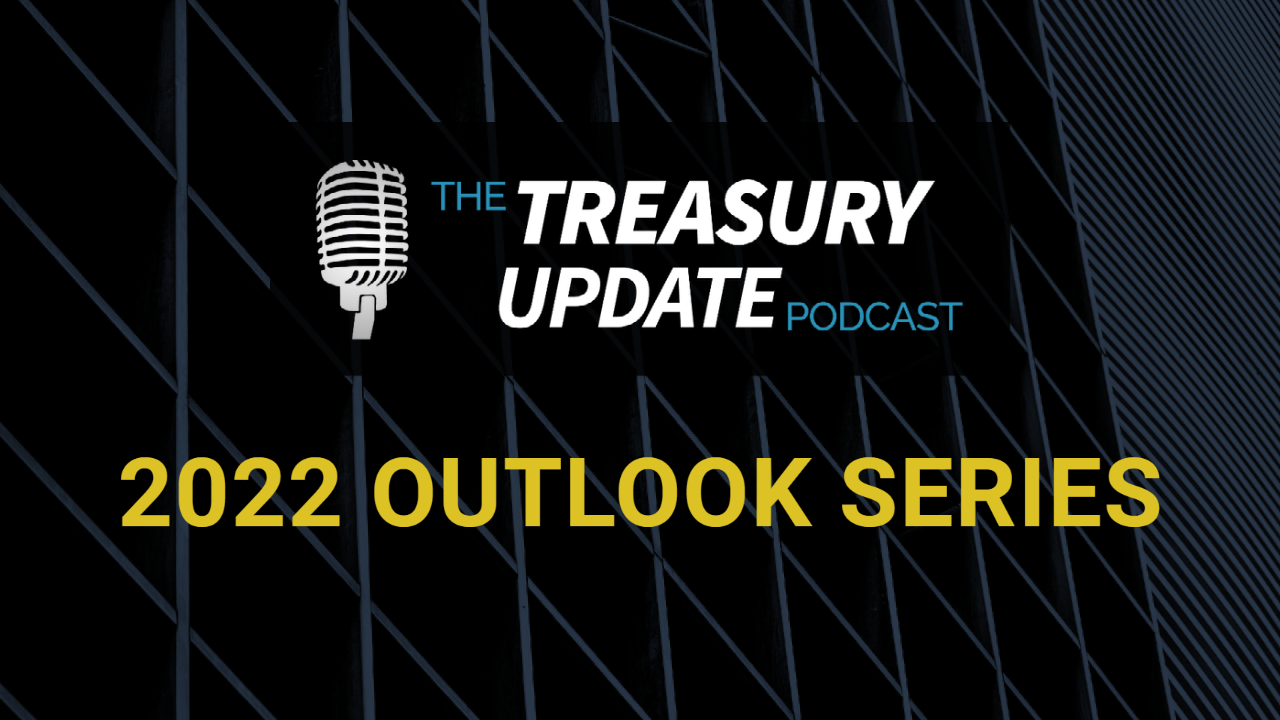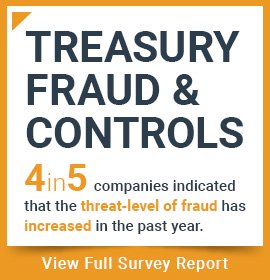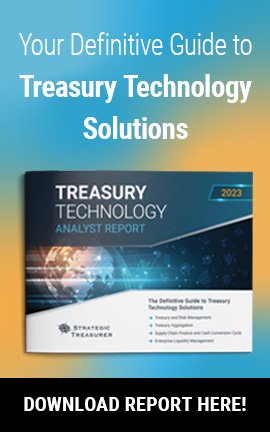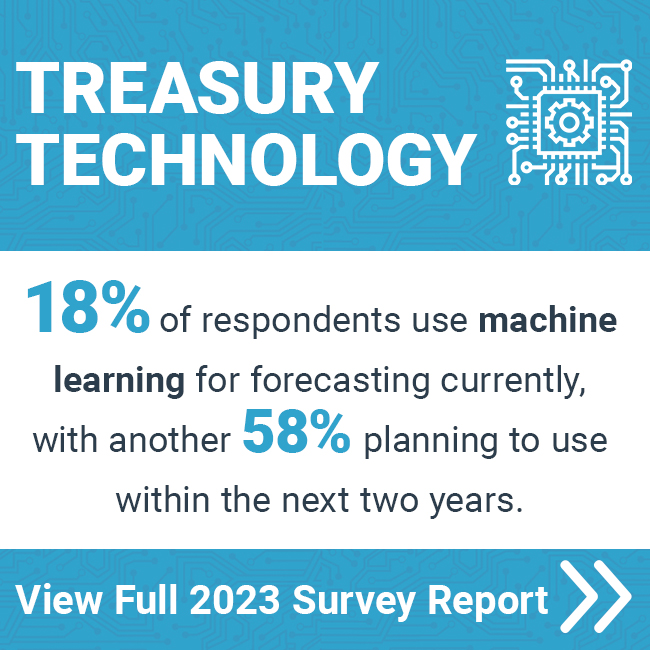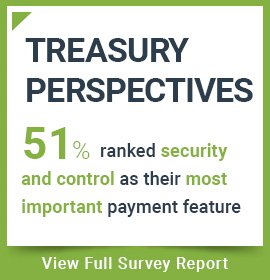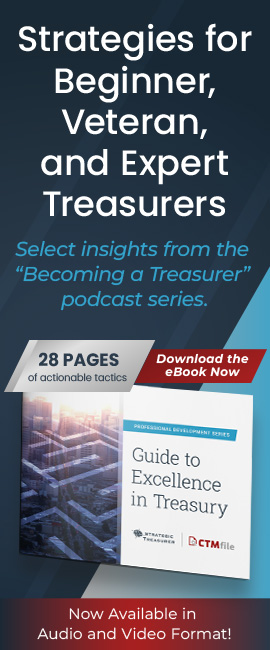
Episode 192
The Future of Treasury Technology: AFP Panel Discussion
Moderator:

Speakers:




Episode Transcription - Episode #192: The Future of Treasury Technology: AFP Panel Discussion
Nicki Gillispie 0:04
Welcome to the Treasury update podcast presented by strategic treasure, your source for interesting Treasury News Analysis and insights in your car, at the gym, or wherever you decide to tune in. On this special episode of the Treasury update podcast, strategic treasure features, its 2021 FinTech Hot Seat panel from the AFP conference. The five panelists discuss topics ranging from the API adoption timeline, the best payment tech to develop this year, the current value of data and more listening and explore the most significant technology changes happening today and their implications for Treasury.
Craig Jeffery 0:49
So just the question I have for you, and I’ll start with you, Evan, on that side, where are we with API’s? What’s going on? Is this a bit more hype? Where are we in the process? And how should we think about it? Just your response?
Evan Mahoney 1:02
So when it comes to API’s, I think the promise of speed and instant connectivity is certainly there. You know, we’re all excited about that we’d love to see that rolled out in a much wider landscape. Currently, I think the extent of API connectivity is still in development is how I would phrase it. But when you’re looking at that, compared to SFTP, just this speed alone is a tremendous advantage. Certainly making progress. Still some ways to go. But I think the Promise is certainly there.
Craig Jeffery 1:33
Great. Jo, would you would you jump in on this one?
Jo K Jagadish 1:36
I think the concept of API’s, obviously, we all know is not new API’s have been around for 40 some years now. But where API’s have become an increasingly important part of our tech stack has been the speed, which you referenced the availability of real time data. But also I think the number of use cases and business models that API’s have enabled us to provide our customers, I think that’s really the promise of API’s. And I would say, I think we think of API’s is just fundamental to how we interact with our FinTech partners, the way we interact with technology assets internally at the bank, to deliver capabilities to our customers, whether it’s on payments, whether it’s data and reporting, has the organization and you know, kind of when I say organization, I think a banking industry evolved, I would say quite significantly, computing power has made API’s just much more relevant in today’s discussion. And so it is definitely kind of a trend that we’re incredibly bullish on. And I think it underpins what we think is our kind of tech strategy and business strategy. So it’s moved from like just a technology conversation to how can API’s enable new capabilities, and hence, it’s most suited to that business conversation. So very, very important asset for us as we think about sort of the future of Treasury and what it can create for customers.
Craig Jeffery 3:02
Yeah, very good. Mitchell, your comments?
Mitchell Thomas 3:04
Yeah, I think from my perspective, a lot of our clients are enjoying the benefits of fully integrated API’s into their systems. So in some of the benefits that they’re seeing from that are increased capital efficiency, because they’re able to consume the API information from their top five banks, really covering 90 plus percent of their global cash to be very efficient with that information, while those other banks are still kind of working through building their technology stack. So what we’ve seen is a lot of the major banks have fully capable, you know, API’s from a treasury perspective, and integrating that information for our corporate clients really provides them with the information that they’ve been lacking over the last 10 to 15 years, when they’re solely reliant upon files and information being pushed to them, instead of really having that information on demand and boiling it into their system for their use.
Craig Jeffery 4:03
Where are we in the process? Are we 20% of the way there 50% I know we’re not more than 70%.
Michael Kolman 4:08
I think we’re at the tip of the iceberg. Literally, right now, we’re focusing on API’s as related to banking API’s. So the ability to get that information more quickly, as has been said, is one piece of it. But I say we’re at the tip of the iceberg. The maturity of API’s from each of different banks is it varies quite wildly, where the value has been our customers have seen and where we’ve connected is really the ability to get real time visibility to those transactions. But there’s so much more we can do and the opportunity that exists to do more. And what I mean by that is in my role, I get to really sort of dream up. What does this mean what when you say real time, well, that changes the landscape of things. So if everything’s happening in real time, when does the day actually end? Right What does prior day reconciliation even mean anymore? And so when you couple together potential really the value and speed of API’s with other technologies like machine learning, like business intelligence tools, and data lakes, and imagine that you’re feeding not only the real time data, but you have the huge amount of history because that’s also available through API’s as
Jo K Jagadish 5:15
If I could answer your question on kind of how ubiquitous it’s become, I’d say there, I’d look at it from two lenses. One is there APIs internally that the banks using for kind of internal systems to talk to one another. And I’d say that level of maturity is probably a lot higher than what we’re seeing in the external API environment. So I’d say I kind of take the lens of, there’s a lot more interest, because there’s just the safety and the soundness of the data. And so when we have different kind of middle office, back office systems, exposing information to customer facing applications, those API’s are becoming a lot more predominant. So we’re re architecting our platforms in a microservices and API based fashion. That’s where all the most of the technology investments continue to go to. When you think about customer facing API’s and kind of what we’re exposing externally to partners, there’s still more maturity, that can happen in that space. And I’d say kind of just an order of magnitude, that’s a lot less than what we’re seeing internally.
Craig Jeffery 6:17
There’s all of this just a discussion between banks and fintechs. Because most of the use of API’s is between these players, what should a corporate or commercial customer think about with regards to API’s? Is it just that’s neat that you guys are doing that? Or is there something else?
Mitchell Thomas 6:34
From my perspective, from the corporate side of things, the true driver, there is some kind of main point. So whether that be the reconciliation on a priority basis, not being fast enough to recognize fraud, having payments on a Friday afternoon, that don’t make it to the bank, and you’ve got funding lapses that cause overdrafts and things like that, because in a traditional file based world, you’re waiting on files to come back. And these kinds of interfaces are not reliable. Whereas when you go to an API based request based system, these kind of interfaces, you know, really their immediate. So it’s a handshake, that immediately as soon as you send a payment, as soon as soon as you request for a transaction, whether that handshake was successful. So it’s not a waiting game, it’s not a guessing game anymore. It’s very, very definitive to where you’re putting the power in the hands of the corporate, to be able to request data from their partners whenever they want. So from what we’ve seen, it’s really some sort of pain point that normally drives the decision to try to look for something that’s more reliable, more timely.
Jo K Jagadish 7:41
API’s between banks and fintechs are for the sole purpose of providing functionality to customers, corporate treasurers, CFOs. And so how do you create a value proposition that is real time for the benefit of the corporate treasurer whose job continues to evolve, and the way that they consume data continues to evolve. And so whether it is kind of real time Cash Forecasting capabilities, global cash positioning, etc, we think that the power of API’s and this partnership between fintechs and banks is really empowering that view for the benefit of our customers, which are the treasurers and the CFOs at our client organizations.
Craig Jeffery 8:17
Great. Let’s shift over to our second topic, which is artificial intelligence and machine learning. First, give us a practitioner’s, a treasury practitioner’s definition of machine learning, and let us know where things are. And then we’ll get into some use cases. So why don’t you begin us?
Michael Kolman 8:31
I guess, if you think about it, from a technology perspective, it’s the ability to be able to not explicitly program a program, but have the program actually learn in order for it to work. Right. So that’s where the historical data comes into play. So we actually an ion about I think it was maybe three or four years ago, we partnered with a university in Europe and collaborated on this research project to really understand what are the most applicable use cases of machine learning in Treasury? No surprise that the top one was Cash Forecasting? That one, I see no surprise, because this is exactly what machine learning is meant to do is to be able to make a prediction about something with with a set of data. And the other thing is, it solves a pain point. The other four top use cases were around matching. So reconciliation, then around categorization of transactions. So hash tagging, then we’ve got our fourth, which is around recommendations. So this would be like an investment recommendation, what where can I invest my excess cash. And then the last one was around anomaly detection.
Craig Jeffery 9:29
So I’ll invite others to jump in as well. But if we look at API’s as perhaps a common replacement or replacement over time as of older legacy connections, like SFTP, whatever that timeframe is, but is machine learning going to be replacing what people are doing as well. If so, does this represent a huge opportunity? Or is this mean there’s going to be less jobs in Treasury in other areas of finance is certainly impacting the accounting world rather than the auditing world very heavily machine learning, what does this mean for how we should approach it both from the fear factor as well as from the opportunity factor?
Evan Mahoney 10:08
Anytime there’s a new technology or a breakthrough in sort of industry standards, we can certainly look at it from a fear or optimistic perspective. Now, I’m a big believer that it’s really an opportunity for the future. So despite the fact that certain jobs may be outsourced or wound down or replaced, due to the innovations in machine learning and AI, I think there’s equally a huge forefront for new opportunities to create those products to innovate in that space. So while it may be a different skill set, you know, within the Treasury arena, there’s a ripe opportunity for tremendous growth within that specialization.
Craig Jeffery 10:50
Great. So there’s hope, there’s still going to be jobs. Jo, do you agree with that?
Jo K Jagadish 10:54
I completely agree with that this is not a new concept. I mean, in human history, right? Every kind of 100 years, there’s a technology that comes around and really changes the way we think about work. And so if you think about the Industrial Revolution, and you know what that did to the workforce, and, you know, a lot of the jobs that existed today didn’t exist 30 years ago, and the jobs that are going to exist 30 years from now don’t exist today. And I think that’s just part of evolution. And, and so I do agree that, you know, rescaling talent is going to be incredibly important. I think the use cases for artificial intelligence are only going to continue to increase as computing power, and the availability of data becomes a lot more prevalent. That’s a good thing. Because, you know, the role of a corporate treasurer, you know, will change from, you know, someone who is manually pulling together information from like, a few different systems and banking applications to how am I leveraging all of that data to create insightful, meaningful recommendations to move my business forward, you just take the example of machine learning and artificial intelligence and what that means to, you know, a CFO or treasurer, that job is going to change. And I think it’s going to change for the better, allowing them to become strategic decision makers on growth of the business. And I think that’s kind of a really important aspect where I see these technologies continuing to drive more value.
Michael Kolman 12:19
Yeah, if I could jump in real quickly, I totally agree with what Jo is saying. But I think we have a long ways to go. Before we get there. Usually, the technology comes well before mass adoption. And so there’s a reliable Treasury researching firm that believes that the use of AI is going to triple over the next two years. And that came from Strategic Treasure. So if there is some research back at you, but I think that.
Craig Jeffery 12:42
I’m not gonna go easy on you during the speed round.
Michael Kolman 12:46
So but I think that that really does say, say a lot. And I think what we’re seeing adoption of AI is there’s a tremendous amount of interest, but equally a tremendous amount of hesitation, what we’re working with our customers on and suggesting is really, you know, when it comes to forecasting, run your run your current forecasting process in parallel with the machine, compare it, I think there’s less frost in the machine, because you don’t necessarily have the visibility and transparency of, of what is the machine thinking that goes behind? What is the person who might be manually providing the forecast, but I think it’s gonna take some time to get over that.
Craig Jeffery 13:19
We’re gonna move to our first speed round, just let’s just go over the rules. For the panelists, you have 15 seconds to respond. We want a real answer, not a, it’s both all the time, we want you to take a position and explain the reason for it to what is more important, and why machine learning or RPA go?
Mitchell Thomas 13:39
I think machine learning is more important, just because it allows you to grow and learn without the need to really program a robotic process. It’s really independent and learns and gets better over time all on its own instead of having to have somebody actually program the bot to do a repetitive task. Great, Jo,
Jo K Jagadish 13:57
I think right now RPA. Because RPA is kind of solving real world problems and taking that manual, repetitive process out of the workforce and allowing them to focus on more intelligent decision making.
Craig Jeffery 14:10
So near term and far term perspectives. Michael, can you break the tie?
Michael Kolman 14:14
I am gonna go with RPA short term, but machine learning really is the future. It’s a that’s a both answer. Well, so I’m going with machine learning, but it is the future as Jo said, RPA is today, but if you’re investing for the future, machine learning goes well beyond the repetitive tasks.
Craig Jeffery 14:30
Have in your turn.
Evan Mahoney 14:31
Yeah, and I would also go with machine learning there with the amount of data that’s available, it just really sets a strong foundation for the future of intelligent treasury. So machine learning,
Craig Jeffery 14:41
alright, so there you have a machine learning by by a nose or some use for RPA is what we hear. So Evan, we’re gonna start with you and reverse the order SFTP secure file transfer protocol or API’s go.
Evan Mahoney 14:54
I would say API’s simply because of the speed that’s available for today’s world. I don’t want to give you a both answer. We obviously have to have a balance between the two. But if I were to say where the future’s heading API’s is where my, my bet would be.
Michael Kolman 15:09
Okay, Michael, no balance coming from me API’s for sure. One caveat is just the maturity, whatever API, you’re you’re thinking, just make sure that the what information you need is there and can replace whatever you rely on.
Craig Jeffery 15:21
Appreciate the titanium spine on that one. That’s great. Jo, how about you?
Jo K Jagadish 15:25
I agree. I think API’s you know, they level the playing field in so many ways between organizations. And, again, they just create a lot of new value in the kind of end to end process. So there’s no doubt that the speed efficiency, the data that travels with the API’s, I think, is incredibly important. So that’s definitely the future.
Craig Jeffery 15:42
It will you dare to set a different response. Go ahead, Mitch,
Mitchell Thomas 15:47
I do not, I’ll have to go with API’s. I just think about it from a consumer perspective, if I can pull, you know, my very uncomplicated total capital portfolio very easily at the palm of my hand, I think it’s something that is well past due for corporate so I guess, definitely APs.
Craig Jeffery 16:04
That one wasn’t close at all, even though the vast majority of transfers are and data is by SFTP. Nobody took the realist realistic position on that. Thanks for your straight up answers. Mitch, we’re going to start with you, we’re gonna go back. What do treasures need to understand about SaaS Software as a Service, go
Mitchell Thomas 16:22
From a SaaS perspective, you just have to look at it from a data control perspective, because you’re putting your data out there outside of your network. So just just understanding, you know, the security of that system, what that system brings, versus something that you were hosting in house. Jo.
Jo K Jagadish 16:39
I agree, I think data security is incredibly important. I you know, I also think about just being aware of the infrastructure that sits behind the applications ability to scale up scale down. These are things that sometimes aren’t, as you know, front and center for the corporate treasurer. But as you think about sort of your holistic, you know, implementation strategy, I think it is important to look at not just the security and soundness, but also kind of the underlying infrastructure that supports it.
Michael Kolman 17:08
Michael, yes, security tops the list, for sure. It’s no longer just the it is problems, treasures needs to be informed. But when it comes to size, in addition to security, really just the benefits, the opportunity are important to understand as well. So constantly potentially getting upgraded and new that you just want to understand when that’s happening, and make sure that you can manage your business.
Craig Jeffery 17:29
I’m gonna shift and and I’m gonna throw you a curveball, because I’m gonna go back to a question I didn’t cover. This is the either or question, what is more important? Why efficiency, or analytics go
Evan Mahoney 17:40
efficiency simply to make sure that we’re getting the job done on time in a reliable, consistent fashion. And I’m going to avoid the bolt there. Greg, just to save you the
Craig Jeffery 17:52
Alright, Michael,
Michael Kolman 17:53
I’m going to upset you. But I’m going to say it’s it’s not an either or, but it’s a sequence. But if you strive for efficiency, you get your efficiency, then you get the analytics, otherwise, you do it the other way around, you’re gonna have a bunch of analytics that isn’t going to be looked at or used. Jo,
Jo K Jagadish 18:07
I was gonna have actually the exact opposite answer as my colleague here. I think analytics, like strong analytics, I think drives efficiency and decision making. And so I think, you know, having a robust data infrastructure, having robust analytics, on top of that data infrastructure, in many ways, creates efficiencies for day to day decision making. And I think that’s incredibly important for someone who is looking at vast amounts of data and trying to make decisions as close to real time as possible. And Mitch,
Mitchell Thomas 18:34
I have to go with efficiency, I think from an efficiency perspective, that’s kind of the framework and the foundation, really, for your analytics. So you’ve got to have efficient processes in place before you kind of layer in the analytics on top of that,
Craig Jeffery 18:47
right, we’ll go back as well with Platform as a Service. So things like Azure, AWS, running things in the cloud, where you can move and transport it. What do treasures need to understand about platform as a service, as opposed to Software as a Service Michif, you’ll begin
Mitchell Thomas 19:03
the speed associated with those offerings when you think about that at AWS, and Azure. So the world really allows and enables some of these real time, you know, treasuries and systems to exist. So that’s kind of the the big thing, I think, from a difference between having an Azure cloud versus a SAS system. Jo,
Jo K Jagadish 19:25
I think it’s about the security, even kind of as you think about making a decision on whether it’s sort of a non prem or an in cloud solution, making sure that you know, the security and the safety and the soundness of your data, I think is at least from a banking perspective, that is probably the single most important area of focus for us. And as we recommend, you know, what corporate treasurer should be thinking about. I do think it is, you know, looking at info security and cybersecurity practices just given the environment that we’re in and the the amount of ongoing challenges that we’re continuing to see in this space.
Craig Jeffery 19:58
Banker talks about security a lot I love to get you on a podcast, Michael.
Michael Kolman 20:03
Once again, I agree with security assets, the top thing, but I would say Platform as a Service is a really nice hybrid between SAS and the on prem. So if you are not comfortable with the full size juice as solution, but you also don’t have the say the IT organization in house to be able to support on prem and your needs, the Platform as a Service is a fantastic option.
Evan Mahoney 20:26
All right, Evan, I would say security is always paramount without question. And Echo, Michael, from an IT perspective, platform as a service just offers more easier, extensible access to a richer ecosystem for an organization. So
Craig Jeffery 20:43
all of those questions were answered properly. Excellent. Let’s start with you. And Evan, and we’ll begin with why should treasures care about business intelligence? And how should they think about it go?
Evan Mahoney 20:56
Well, I think, first and foremost, from a business business intelligence perspective, it allows for more actionable decision making. And to care about that, I think to have the right systems in place where you have that business intelligence, you have the information to act in a timely manner really just puts you at an advantage from managing your treasury operation. Michael,
Michael Kolman 21:18
I agree. I mean, I think the intelligence is power. I mean, it holds true here in Treasury as well. In our own organization, outside of Treasury, we constantly have more and more dashboards that we’re creating just to manage the business with so many dashboards now that you’re duplicating dashboards. So I think what’s what’s great about all of this is that people love intelligence are craving data, and it’s becoming infectious. And being able to manage that in a smart way is going to be the next challenge we have to face.
Jo K Jagadish 21:47
I mean, it’s hard to say anything different because you know, everything that my panelists are covering, it’s exactly accurate, I would say that, at the end of the day, what is hard is to create sort of what we call normalized data, right? You take data from so many different applications and create kind of one pertinent data lake from which you can derive kind of your real time data and insights, that’s hard. But the value in the investment in doing that, I think, pays dividends down the road across all of the Treasury offices decision making process. So I think kind of pertinent investment in the right applications to create the right reporting. And, you know, whether it’s kind of real time dashboards, etc, or just, you know, insights, as a service become, I think, incredibly important for the rule of the of the treasurer. So, you know, I agree with everything everyone said,
Craig Jeffery 22:35
Alright, let me jump in and add to a question to that and break the speed round a bit. Is business intelligence more valuable for more robust dashboarding? And seeing things for different ways? Or is its value more tied up in the ability to self service and self discover that you can put weightings on those this as you can put 5545?
Jo K Jagadish 22:57
I mean, at the end of the day, the data is all about the decision making process, right. And so I think the ability to quickly reconcile that information and make those decisions in a self serve way to me is, I think, where the value sort of sits. And so if you think about, you know, what’s happening in kind of the consumer space, right, you’re able to a lot of banks and fintech firms are taking your data, and then they’re giving you insights based on your transaction behavior. That’s no different what I think is happening kind of in the in the corporate, Treasury world as well. So I think I would wait the the ability to make those, you know, self service, a real time insights probably put a premium on that on that aspect. Mitch,
Mitchell Thomas 23:40
yeah, I’m gonna tie those two together, I feel like the the point of the dashboard says, As I work with our product team is always to, you know, to allow self service. So when I build a dashboard, you know, it’s not what the purpose of having a pretty picture, it’s with the purpose of allowing those users to use that dashboard and really make key decisions. So one of the big selling points of, you know, intelligent data, and dashboards is, you know, from a treasury perspective, you can really retain your top talent at that perspective at that point, because you’re not having to go and manually pull things from multiple different places, you know, your top talent can look, make decisions based off of really, you know, informed quality data in a single kind of interface. So they’re not having to kind of randomize their day,
Jo K Jagadish 24:26
I’ll maybe add one more thing I forgot to say is your it’s going to be really expensive to find enough data scientists to create custom queries. So the more self service, you can create your dashboards, the better your economics because it is a very hard skill set to find in the industry. And so, back to your point democratizing the intelligence and the decision making process through a self serve fashion, I just, you know, think is a more prudent economically prudent way to go.
Craig Jeffery 24:55
Okay, we’re gonna accept the speed round and move into a topic called speed and time treasury. And we’re gonna go Michael, Mitch and Jo on this one. So there’s a lot of talk about API’s, we had conversations about that. It speeds things up. How much is speed overblown? How much is speed necessary? What are the preconditions? We talked about Faster Payments, but not everyone’s concerned just about speeds made me a component. So what are the preconditions for speed that are essential?
Michael Kolman 25:24
I mentioned this earlier, you know, in my might example of what is what is prior day mean anymore when you’re living in a real time world? And so with speed, and let’s say something, I guess, probably a bit controversial here. One question I constantly ask myself is, how can you run Treasury with just one person? Right? And so that’s not meant to take people out of Treasury? That is actually the exact opposite point of the question. But it does make you sort of think we don’t have customers come to us saying, my treasury team is doubling, they come to us saying my treasury team is shrinking, or I need to provide my my business with additional support, right, they’re looking for more and with this additional focus on liquidity, this becomes more of a challenge. So people are looking for automation. And so when we think about the question in that context, I think API’s and we think about how does it enable automation. And we think about coupling these technologies that I talked about API’s, together with machine learning to automate the reconciliation process to automate your visibility to cash, when you think about that, what is less left for the cash analyst to do? And so I think that the question when it comes to speed is if I can have this data in real time, I can process the data, I then really am left with just what are the exceptions, what happened that I wasn’t expecting to happen? And that’s where people should should spend their time is trying to figure out, well, what do I do here, and then kind of going back to well, that then leaves more time to actually analyze and look at the data and make make better decisions through your analytics. So I think everything’s builds on the value just builds on each other. And I don’t think I think if we think about each of these technologies, we’re talking about API’s, specifically, as a mutually exclusive opportunity, we really significantly less than to value.
Mitchell Thomas 27:11
When you think about the speed, sometimes you get into organizations where that’s that’s not a huge selling point, and that it’s not a huge benefit. But when you think about the other kind of pieces of the puzzle that come along with that speed, the reliability, the security, to where you’re not, you know, doing those things like writing out files, and things like that, that give you a momentary point of fraud sitting on your network. So I think, from our corporate perspective, there’s always something different that can be benefited from the API’s. If somebody’s running a tight ship, you know, in a lot of cases, the speed can be paramount, because they’re able to always have that fully accurate information. But for other groups, you know, it’s really the security aspect of it, it’s a point to point communication, it’s much more secure than if you’re writing a file out and sending it across. So I think when it comes to to API’s and speed, yes, they’re faster, but they’re also more reliable and more secure.
Craig Jeffery 28:05
Defects matter more than speed. And reliability matters more than speed, does speed matter.
Jo K Jagadish 28:12
I think it matters in the context of what the clients trying to do. So for example, if you’re a property casualty insurance company, and you need to get a payment to your customer, in real time, because they have, you know, their house burned down. I think speed is incredibly important. Because it is differentiating, right your value proposition and serving your customer at the time of need. If you are a gig economy, employer, being able to pay your workforce quickly could be a differentiator. And it could create allow you to retain a, you know, a workforce that is that has very, very high rates of attrition. If you are sending a $10 million payment to your supplier, you may want to be 100% sure that that is the right account number and you’re sending it to the right company or to the right individual, and maybe speeds not that important, maybe kind of the assurity of the payment is probably a lot more relevant. So I think it depends on the use case. And how do you leverage speed for the benefit of your business model to create either a differentiated customer experience, or to make sure that you’re meeting kind of your your vendor relationships, etc. So that’s kind of how I think about speed.
Craig Jeffery 29:32
Can any of you think of examples where things are moving slower, that things don’t inexorably move towards faster? Whether speed is the driving factor or not? Can you think of anything in finance, and Treasury and banking where things are slowing down?
Michael Kolman 29:48
I guess slowing down for a purpose. Right? So perhaps a payment slows down because you have anomaly detection and it detects an anomaly or it slows down because It has been screened for sanctions and the sanctions party pops up. So you’re slowing it down for a benefit, you’re being more cautious on those high value payments.
00:30:11 Craig Jeffery
If speed has reason and drive in conjunction with other areas, we’re talking to corporate treasurers technology directors at large corporations, mid sized corporations.
00:30:22 Craig Jeffery
How do they need to think about the implications of speed matters, usually in conjunction with something else, but what do they need to do to prepare themselves for faster?
00:30:35 Mitchell Thomas
To really prepare for the faster, you’ve got to first look at your your infrastructure from a corporate perspective.
00:30:38 Mitchell Thomas
So what are my systems that need to
00:30:41 Mitchell Thomas
Really consume that this faster data that I’m looking at, you know, is it a single system?
00:30:46 Mitchell Thomas
Is it a group of systems?
00:30:48 Mitchell Thomas
Do I need to then look at potentially a data lake to make it available to numerous different locations and be able to run various types of reporting and things like that off of it?
00:30:57 Mitchell Thomas
A lot of times it’s an inward looking look at your system infrastructure and then secondary really looking at your your IT allocation because you know from an API
00:31:06 Mitchell Thomas
Perspective if you’re talking about real time, a lot of these specifications you get from banks are in thousands pages.
00:31:12 Mitchell Thomas
So do I have the talent internally to build this?
00:31:16 Mitchell Thomas
Once I decide yes, I need real time.
00:31:18 Mitchell Thomas
Or do I need to look out and try to find somebody that that knows how to do it to ultimately bring that information in?
00:31:25 Craig Jeffery
That’s sort of sounded like how do I identify the slowest links in my process?
00:31:29 Craig Jeffery
In one summary.
00:31:31 Craig Jeffery
Any anybody else want to add on that?
00:31:33 Evan Mahoney
Yeah, I would just say before moving at an accelerated.
00:31:36 Evan Mahoney
Pace, I think it’s.
00:31:37 Evan Mahoney
Always good to make sure that your core operations are sound.
00:31:41 Evan Mahoney
You have a good grasp on how things are running and then you can.
00:31:45 Evan Mahoney
Pick up the.
00:31:45 Evan Mahoney
Pace so I.
00:31:46 Evan Mahoney
I would never advise anyone that prioritize speed.
00:31:50 Evan Mahoney
If they don’t have accuracy, security, analytics, you know, the right sort of precursors to that.
00:31:57 Evan Mahoney
Very important back step.
00:31:59 Craig Jeffery
Yeah, so that that brings us into the next section.
00:32:01 Craig Jeffery
I’ll start with you again, Evan. We’re going to talk about big data and analytics.
00:32:06 Craig Jeffery
There’s a lot of talk and discussion about how rapidly data is exploding and growing.
00:32:12 Craig Jeffery
Most estimate that it double every two years.
00:32:15 Craig Jeffery
40 to 60% growth per annual measurement time.
00:32:18 Craig Jeffery
So it’s growing really rapidly.
00:32:20 Craig Jeffery
How do we control that?
00:32:21 Craig Jeffery
How do we manage that and big data and analytics tends to be part of the solution set that they’re talking about.
00:32:28 Craig Jeffery
So many are excited about it.
00:32:31 Craig Jeffery
What is the what is the opportunity?
00:32:32 Craig Jeffery
For treasury for technology firms, for banks, for professional treasury people in large, medium sized and small companies? If you’d begin.
00:32:42 Evan Mahoney
So from a big data perspective, I think first and foremost for organizations to be able to capture their data to warehouse it to organize it appropriately, and then once they have those systems in place to build on top of that, the right algorithms machine learning AI that helps them.
00:33:02 Evan Mahoney
Utilize that warehouse of data so.
00:33:05 Evan Mahoney
If I’m looking at.
00:33:05 Evan Mahoney
It from a corporate perspective I.
00:33:07 Evan Mahoney
Really think there’s two levels?
00:33:08 Evan Mahoney
Securely warehousing the data.
00:33:11 Evan Mahoney
Self and then utilizing their warehouse of data through intelligent treasury mechanisms.
00:33:17 Craig Jeffery
OK Jo, would you like to
00:33:19 Jo K Jagadish
Weigh in on this?
00:33:20 Jo K Jagadish
I started my career as a data scientist so I could talk about this for a long time.
00:33:26 Jo K Jagadish
But what I would say is a couple of things.
00:33:28 Jo K Jagadish
One is, you know there is so many applications that you could leverage data and analytics for.
00:33:34 Jo K Jagadish
Before you have to, in many organizations, really prioritize what you’re trying to do, because the more information you have, the more applications there will be, and so you put a lot of priorities on, again, a team that is hard to retain and hard to
00:33:54 Jo K Jagadish
find talent for.
00:33:56 Jo K Jagadish
So I think this internal prioritization process of how are we doing as an organization leverage the data and what are some of the things that are most important for us?
00:34:06 Jo K Jagadish
To me I think is a very prudent way for any organization to think about right.
00:34:10 Jo K Jagadish
It could be for security purposes, for, you know, fraud prevention.
00:34:15 Jo K Jagadish
It could be for.
00:34:16 Jo K Jagadish
Personalization and contextualization of your experience of your products and experiences. It could be you know we call the journey mapping of a customer. And how does a customer can move from point A to point B
00:34:28 Jo K Jagadish
in their lifecycle?
00:34:29 Jo K Jagadish
There imperative ways that organizations should be thinking about leveraging their data.
00:34:34 Jo K Jagadish
I think a good place to start is kind of what’s important for them.
00:34:36 Jo K Jagadish
How do you leverage that data to differentiate yourself from your competitors and then you know how do you can use that to provide much more contextual relevant experiences?
00:34:46 Jo K Jagadish
’cause that’s where really the as an industry.
00:34:48 Jo K Jagadish
We’re all headed towards right, and so I think those are some of the considerations that.
00:34:52 Jo K Jagadish
I would think.
00:34:52 Jo K Jagadish
About as I think about the you know, what would I want to do as
00:34:57 Jo K Jagadish
I chart my data strategy in my organization?
00:35:00 Craig Jeffery
Everyone should be coming up with data.
00:35:02 Craig Jeffery
Strategy is what I heard.
00:35:03 Craig Jeffery
You say banks, fintechs, corporations.
00:35:05 Craig Jeffery
What’s the current value of data compared to let’s say Treasury is making sure that they have that they’re performing risk management functions, liquidity management functions?
00:35:16 Craig Jeffery
Data supports those activities helps into analysis, so it’s not like.
00:35:20 Craig Jeffery
It’s either or.
00:35:21 Craig Jeffery
This is not the speed round you got to pick one or the other, but how is data growing?
00:35:27 Craig Jeffery
In value when when will it cross the 50% threshold compared to some of these other areas?
00:35:33 Craig Jeffery
Or has it?
00:35:34 Craig Jeffery
And I’ll leave that to Joe.
00:35:36 Craig Jeffery
You can start and since you said you’re data scientist, you have to have an answer on that and others can jump in.
00:35:42 Jo K Jagadish
Maybe I’m biased, but I think the data in many
00:35:45 Jo K Jagadish
ways is what it’s all about.
00:35:47 Jo K Jagadish
To be honest with you, whether it’s payments, whether it’s product, whatever it is at the end of the day that you know you’re trying to do, even if it is calling an Uber and trying to get to the airport, like, it is
00:35:59 Jo K Jagadish
all about the information.
00:36:00 Jo K Jagadish
So I’m a big believer that this technology and the ability to process, analyze, derive insights from it,
00:36:07 Jo K Jagadish
is probably the single most important
00:36:10 Jo K Jagadish
aspect of what I think, you know,
00:36:12 Jo K Jagadish
organizations should be thinking about as they char their strategy for growth.
00:36:16 Jo K Jagadish
And again I
00:36:17 Jo K Jagadish
say this that I may be completely biased in that, but I do think it’s that important.
00:36:21 Jo K Jagadish
I think the ability to invest in the right solutions, the right kind of infrastructure, platforms, the right
00:36:28 Jo K Jagadish
people, and then
00:36:29 Jo K Jagadish
You know the ability to kind of create what we call democratization of data and and you know, empower.
00:36:35 Jo K Jagadish
Whether it’s your credit organization, your risk organization, your fraud, your product, your customer service.
00:36:41 Jo K Jagadish
I mean, this will really fulfill kind of the needs end to end across your business. I couldn’t put enough of a premium
00:36:48 Jo K Jagadish
on a data-driven organization, ’cause that’s where I think you can really truly differentiate yourself.
00:36:55 Craig Jeffery
If you’re biased, I think everyone was nodding with you, so we have a biased panel up here. Anybody else?
00:37:00 Evan Mahoney
I think Jo brings up a great example across departments.
00:37:05 Evan Mahoney
I mean, data is really the lifeblood of an organization.
00:37:08 Evan Mahoney
The market has an awareness
00:37:10 Evan Mahoney
now, you know, big data is enough of a buzzword that we’re all familiar with that.
00:37:15 Evan Mahoney
Really being kind of the next wave and watching that unfold across the organization, I think is very exciting and promising and
00:37:23 Evan Mahoney
That’s what I think will position the future for our successful treasury departments.
00:37:27 Craig Jeffery
So speed round and we’ll start with Evan.
00:37:29 Craig Jeffery
The first one will be.
00:37:31 Craig Jeffery
We just heard that data is king and we’ve all long believed that cash is king is the data is king or cash is king.
00:37:38 Craig Jeffery
Cash is always king.
00:37:39 Craig Jeffery
If you’re not able to maintain liquidity, then you know.
00:37:43 Evan Mahoney
There’s not much promise for the business, but so I’ll just.
00:37:46 Evan Mahoney
Leave it there.
00:37:47 Craig Jeffery
- Michael?
00:37:49 Michael Kolman
Uh, yeah I.
00:37:49 Michael Kolman
Think cash is king.
00:37:50 Michael Kolman
If you don’t have the cash.
00:37:52 Michael Kolman
I mean the.
00:37:52 Michael Kolman
Business continuity and you just think let’s go back to the basics so cash has clearly got to be king that it became what we
00:37:58 Michael Kolman
build out with data.
00:37:59 Craig Jeffery
Jo?
00:38:01 Jo K Jagadish
I agree. I think you know cash or in the physical sense probably.
00:38:06 Jo K Jagadish
Hopefully not so much longer, but you know maybe did little cash will be king.
00:38:11 Jo K Jagadish
That’s kind of the day and age.
00:38:12 Jo K Jagadish
We’re looking forward to, and I think the data to support that will be defining so.
00:38:16 Jo K Jagadish
So yes, you you absolutely need the liquidity to implement
00:38:20 Jo K Jagadish
any of these technology enhancements.
00:38:23 Craig Jeffery
Mitch.
00:38:25 Evan Mahoney
I have to agree. So I think cash is king.
00:38:26 Evan Mahoney
But the data really supplements that, so you’re
00:38:28 Evan Mahoney
able to more efficiently
00:38:29 Evan Mahoney
manage your cash and really have your cash work for you
00:38:32 Evan Mahoney
better if you’ve got
00:38:33 Evan Mahoney
the better data associated
00:38:35 Evan Mahoney
with it, you can
00:38:35 Evan Mahoney
kind of work with a slimmer margin.
00:38:39 Craig Jeffery
So perhaps data is still a member of the royal family, but maybe not king is what we’re going on.
00:38:42 Craig Jeffery
Alright, so, so what’s the best use of technology we’ve seen with payments or treasury in the past year and then, what’s your prediction for the technology change in five years? Go Mitch.
00:38:58 Mitchell Thomas
I think over the last year that
00:39:00 Mitchell Thomas
The best kind of technology, I guess that I’ve seen associated with payments is just the APIs and the tracking associated.
00:39:06 Mitchell Thomas
With the payment.
00:39:07 Mitchell Thomas
Having definitive knowledge of your cross-border payment made it to where it’s going. I think it’s something that’s we’ve been missing for a long time, because those are typically there.
00:39:16 Mitchell Thomas
The problem pieces for when you’re making those large value cross-border transactions, so I think having your banks be able to provide that information as far as tracking on those high value transfers that are going around the world. I think that’s kind of the biggest piece of.
00:39:31 Mitchell Thomas
They’re kind of a puzzle that’s from a payment tracking perspective. It’s been missing over the last few years, and I think that’s only going to get better to be domestic and international, so we’ve got that tracking for cross-border.
00:39:42 Mitchell Thomas
I think over the next you know three or five years.
00:39:44 Mitchell Thomas
We’ll find a way to to perform that same level of tracking domestically for those same kind.
00:39:49 Mitchell Thomas
Of wire transfers.
00:39:51 Craig Jeffery
Excellent Jo.
00:39:52 Jo K Jagadish
I think there are single, biggest important kind of innovation or technology in the last two years since the pandemic started as digital interfaces, right?
00:40:01 Jo K Jagadish
I mean, if you think.
00:40:01 Jo K Jagadish
About what just the world went through.
00:40:04 Jo K Jagadish
Over the last almost two years now, the ability to still run your business.
00:40:10 Jo K Jagadish
And be able to do that through.
00:40:12 Jo K Jagadish
You know whether it was applying for, like a paycheck, protection program loan or it was, you know, driving by your branch and you know getting your debit card, you know delivered to you at your door, which is what TD Bank did because you were able to order that debit card through your mobile application.
00:40:26 Jo K Jagadish
But to me I think all of that is being powered by digital.
00:40:30 Jo K Jagadish
Interfaces and digital applications.
00:40:32 Jo K Jagadish
In many cases, that’s kept the lights on.
00:40:35 Jo K Jagadish
For hundreds and thousands of small businesses in the country, and so to me, I think about maybe the single most profound, the important impact of technology over the last year and a half has been allowing people to get paid, allowing people to kind of keep their businesses still up and running, and that wouldn’t have been possible with many of the investments that we’ve made in digital.
00:40:56 Jo K Jagadish
And to be able to in many cases, you know many of the banks overnight stepped up and pivoted to PPP. You know you think of could that have been possible 25 years ago or 30 years?
00:41:07 Jo K Jagadish
Years ago, without the investments that organizations are making in digital, and I think probably not.
00:41:12 Jo K Jagadish
And so you know, thank God that we had the pandemic in a day and age where technology is incredibly ubiquitous and valuable.
00:41:20 Jo K Jagadish
Because I mean, I can’t imagine what businesses and society would have to go to if we had the pandemic.
00:41:27 Jo K Jagadish
You know, without this ubiquitous kind of digital ecosystem.
00:41:32 Craig Jeffery
Very good. Michael.
00:41:32 Speaker 1
I think.
00:41:34 Michael Kolman
We at the beginning of the pandemic held a fireside chat with customers and asked them what do they want to talk about and we wanted to talk about how are they handling offline processing.
00:41:43 Michael Kolman
So we talked about.
00:41:45 Michael Kolman
Actually, I don’t think the word digitalization has been used in this is maybe the first panel, probably in all
00:41:49 Michael Kolman
of AFP that hasn’t said
00:41:50 Michael Kolman
that yet, but I think it’s real, it’s accelerating.
00:41:53 Michael Kolman
This is what people want to talk about, and the good thing is, I think the technology is there.
00:41:57 Michael Kolman
It’s just a matter of adopting it.
00:42:00 Michael Kolman
And when we think about.
00:42:02 Michael Kolman
The best use of technology and
00:42:04 Michael Kolman
how to apply
00:42:04 Michael Kolman
over the next five years, I think that there’s a lot if we go outside the commercial banking world into really thinking about capital structure, optimization, and so thinking about how companies can be more proactive in financing or refinancing any debt that they have outstanding.
00:42:20 Michael Kolman
Right now, there’s no benchmark.
00:42:21 Michael Kolman
There’s no way, no place to look to see what are your comparables are doing in terms of issuing debt.
00:42:27 Michael Kolman
What rates are they issuing at?
00:42:28 Michael Kolman
What tenders are they issuing at?
00:42:30 Michael Kolman
00:42:32 Michael Kolman
Really taking hold and optimizing your capital structure to really lower the cost of funding
00:42:35 Michael Kolman
I think is a is a huge opportunity and we’re starting to see a couple of use cases over last year of that being possible.
00:42:43 Michael Kolman
Especially in the smaller companies that are probably less well banked from the investment banks.
00:42:51 Craig Jeffery
Thank you. And Evan.
00:42:52 Evan Mahoney
Yeah, and I’ll actually use the word.
00:42:54 Evan Mahoney
As Michael mentioned, digitalization, I think is a huge transformation that’s occurred recently.
00:43:00 Evan Mahoney
Really, the main benefit of that is having greater visibility across a number of functions within treasury.
00:43:07 Evan Mahoney
So as I look to the future over the next five years.
00:43:10 Evan Mahoney
Now if we can look at our current visibility today.
00:43:13 Evan Mahoney
I mean I see that just exponentially increasing.
00:43:16 Evan Mahoney
So I would say you know the digital expansion and ability to leverage that for decision making has been really instrumental.
00:43:28 Brian Cochrum
You’ve reached the end of another episode of the Treasury Update Podcast. Be sure to follow Strategic Treasurer on LinkedIn. Just search for Strategic Treasurer.
This podcast is provided for informational purposes only and statements made by Strategic Treasure LLC on this podcast are not intended as legal, business, consulting, or tax advice. For more information, visit and bookmark strategictreasurer.com.




